The AMD Ryzen 5 1600X vs Core i5 Review: Twelve Threads vs Four at $250
by Ian Cutress on April 11, 2017 9:00 AM ESTBenchmarking Performance: CPU Encoding Tests
One of the interesting elements on modern processors is encoding performance. This includes encryption/decryption, as well as video transcoding from one video format to another. In the encrypt/decrypt scenario, this remains pertinent to on-the-fly encryption of sensitive data - a process by which more modern devices are leaning to for software security. Video transcoding as a tool to adjust the quality, file size and resolution of a video file has boomed in recent years, such as providing the optimum video for devices before consumption, or for game streamers who are wanting to upload the output from their video camera in real-time. As we move into live 3D video, this task will only get more strenuous, and it turns out that the performance of certain algorithms is a function of the input/output of the content.
7-Zip
One of the freeware compression tools that offers good scaling performance between processors is 7-Zip. It runs under an open-source licence, is fast, and easy to use tool for power users. We run the benchmark mode via the command line for four loops and take the output score.
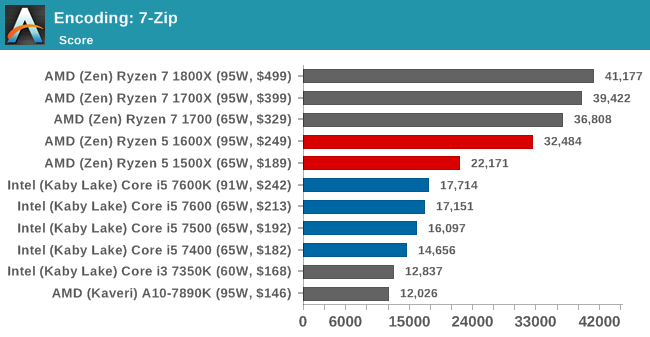
WinRAR 5.40
For the 2017 test suite, we move to the latest version of WinRAR in our compression test. WinRAR in some quarters is more user friendly that 7-Zip, hence its inclusion. Rather than use a benchmark mode as we did with 7-Zip, here we take a set of files representative of a generic stack (33 video files in 1.37 GB, 2834 smaller website files in 370 folders in 150 MB) of compressible and incompressible formats. The results shown are the time taken to encode the file. Due to DRAM caching, we run the test 10 times and take the average of the last five runs when the benchmark is in a steady state.
AES Encoding
Algorithms using AES coding have spread far and wide as a ubiquitous tool for encryption. Again, this is another CPU limited test, and modern CPUs have special AES pathways to accelerate their performance. We often see scaling in both frequency and cores with this benchmark. We use the latest version of TrueCrypt and run its benchmark mode over 1GB of in-DRAM data. Results shown are the GB/s average of encryption and decryption.
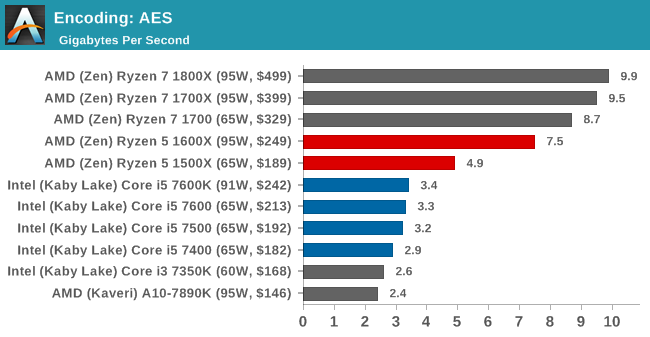
HandBrake H264 and HEVC
As mentioned above, video transcoding (both encode and decode) is a hot topic in performance metrics as more and more content is being created. First consideration is the standard in which the video is encoded, which can be lossless or lossy, trade performance for file-size, trade quality for file-size, or all of the above can increase encoding rates to help accelerate decoding rates. Alongside Google's favorite codec, VP9, there are two others that are taking hold: H264, the older codec, is practically everywhere and is designed to be optimized for 1080p video, and HEVC (or H265) that is aimed to provide the same quality as H264 but at a lower file-size (or better quality for the same size). HEVC is important as 4K is streamed over the air, meaning less bits need to be transferred for the same quality content.
Handbrake is a favored tool for transcoding, and so our test regime takes care of three areas.
Low Quality/Resolution H264: He we transcode a 640x266 H264 rip of a 2 hour film, and change the encoding from Main profile to High profile, using the very-fast preset.
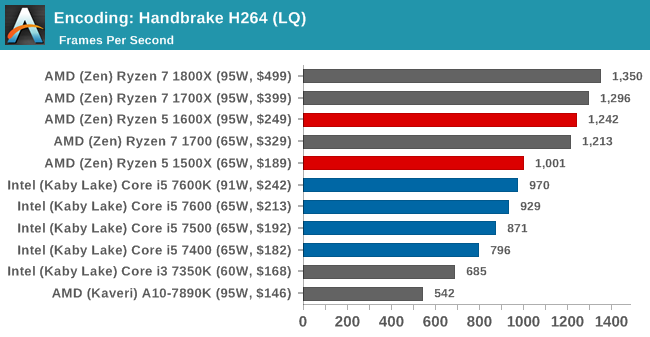
High Quality/Resolution H264: A similar test, but this time we take a ten-minute double 4K (3840x4320) file running at 60 Hz and transcode from Main to High, using the very-fast preset.
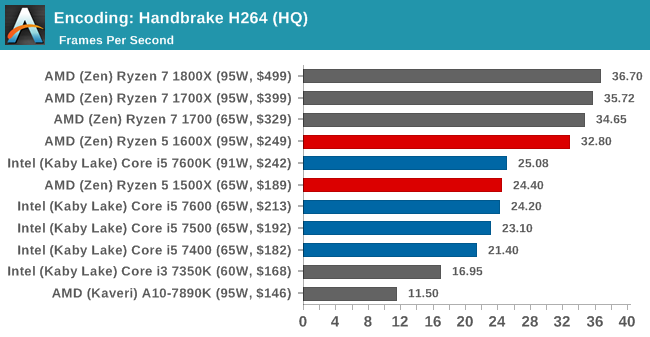
HEVC Test: Using the same video in HQ, we change the resolution and codec of the original video from 4K60 in H264 into 4Kp30 HEVC. This causes a dramatic reduction in filesize (this is a different test to the Ryzen 7 review).
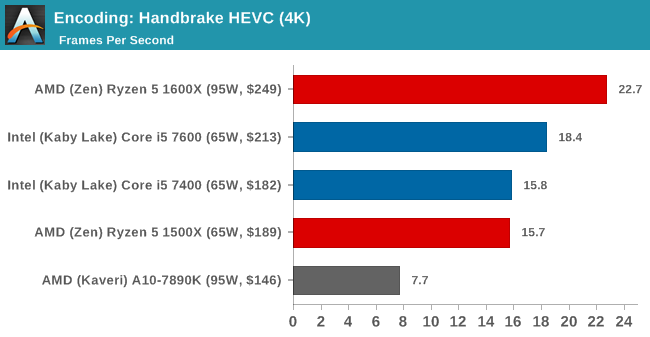


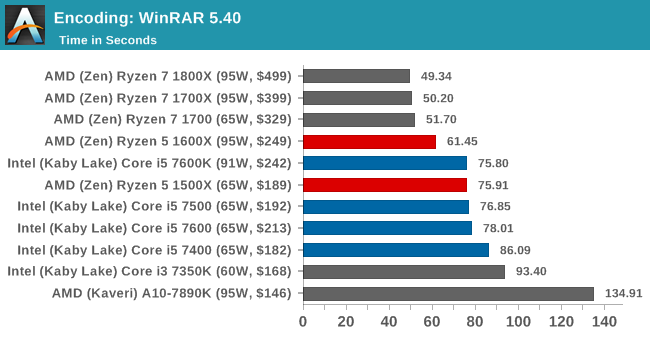








254 Comments
View All Comments
lefty2 - Tuesday, April 11, 2017 - link
Yeah, also with the RX 480 the i5 7400 scores better then i5 7600 (by a huge margin)! That makes no sensesharrken - Wednesday, April 12, 2017 - link
AdoredTV did a very interesting video about exactly this issue, called "Ryzen of the Tomb Raider". In pretty extensive testing they show that something is definitely wrong with Nvidia cards in DX12 on Tomb Raider.https://www.youtube.com/watch?v=0tfTZjugDeg
On a Ryzen 1800X system, crossfire RX 480's beat out an overclocked Titan X, 90fps on the 480's and only 80fps on a Titan X - which is just ridiculously wrong when you look at the relative GPU power.
Some other people have run more tests, and a similar thing is happening in The Division, so it seems highly likely that Nvidia has some strange issues somewhere along the line with DX12.
https://www.reddit.com/r/Amd/comments/62n813/inspi...
milli - Wednesday, April 12, 2017 - link
It's also happening in Battlefield 1, Deus Ex: MD & Total War: W.https://www.computerbase.de/2017-03/amd-ryzen-1800...
Are nVidia drivers not detecting Ryzen CPU's correctly or is it foul play?
mdw9604 - Thursday, April 13, 2017 - link
Poor AVX implementation /w AMD and the driver.milli - Thursday, April 13, 2017 - link
What has AVX to do with nVidia's DX12 drivers???bug77 - Tuesday, April 11, 2017 - link
Really great job not throwing intel power consumption in there for comparison. /sIan Cutress - Tuesday, April 11, 2017 - link
Mainly because that part of the discussion was purely to do with CCX arrangement and core loading.But sure, because you asked so nicely. /s They've been added.
bug77 - Tuesday, April 11, 2017 - link
Thanks.Phiro69 - Tuesday, April 11, 2017 - link
Could you comment on your Chromium Compile benchmark a bit; I'd like to use it as part of a pitch on why our compile farm needs replacing (e.g. "look what a $249 cpu can do").What OS did you build under, I'm guessing Windows 10 from your earlier statements in the full article?
Did you follow these directions for the most part? https://chromium.googlesource.com/chromium/src/+/m...
If so (and you used Windows 10), then you used Visual Studio? Which version and which license of VS?
Thanks! Great review!
Ian Cutress - Tuesday, April 11, 2017 - link
Win 10 x64 Pro v1607, Build 14393.953. VS Community 2015.3 with Win10 SDK. I bascially followed the instructions in that link. :)